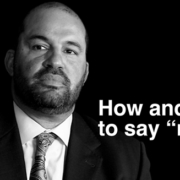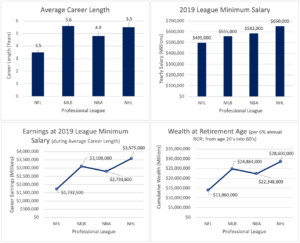COVID-19 Impact on Sports and Entertainmnet
To Defy a King
In 776 BC, Greek King Iphitos infamously established that sports stop for no one, declaring that for seven days prior and seven following the ancient Olympic games there was to be no conflict (1). This allowed the great soldiers and athletes of the day to return from battle and compete against their peers for eternal Olympic glory. In the modern era, the day before and after the Major League Baseball (MLB) All-Star game remain the only two days per year without a major professional sporting event (2). When you include all the additional types of competition available that fall outside the realm of major professional sports, in a regular year, every new day provides fans some type of event to help them experience the exhilaration of sports.
Routinely and effortlessly, real-life superheroes surpass personal bests, unify regional biases, fuel generational rivalries, and entertain onlookers worldwide. Crowds assemble to see what remarkable play, unpredictable performance, or unparalleled physical feat will occur to influence the future of the game. Living vicariously through sports and undergoing the euphoria of success or the bitterness of defeat alongside their champions makes fans feel like an integral part of their favorite team. The uplifting and inspiring nature of competition renders it an essential component of our society. Sports transcend the rigors, issues, and prejudices of regular life and revolve solely around the idea of performance, competition, and achievement. Elite athletes and their unique abilities provide everyone a window to childhood dreams in an idyllic setting and a glimpse at the extreme capabilities of the human body, mind, and spirit. Sports inspire people to believe in the extraordinary and to reach beyond what they know as normal to achieve what they thought was impossible.
The first quarter of 2020 has made a clear statement that this year intends to be remembered as a distressing one. As the magnitude of the COVID-19 pandemic engulfed the globe, the consequences were felt in every aspect of human life. By early March, National Basketball Association (NBA) suspended play on March 11th, and the NCAA and its member institutions began canceling conference basketball tournaments and eventually the NCAA National Basketball Championship tournament; one of the greatest sources of work distraction in America was canceled and gone in a flash (3). One by one, every amateur and professional event fell prey to COVID-19. All sports activity halted abruptly, postponed indefinitely, or canceled. An abundance of unknowns spilled into a void so massive that no other world event in modern history could compare.
Sports dominates the attention of American viewers like no other type of entertainment, boasting most of the viewership for the top 50 all-time ranked broadcasts (4). Sports give many people a temporary release from their daily rituals. Bars, restaurants, stadiums, and arenas are packed with sports fans. Even living rooms are filled with large high-def televisions and crowd-mimicking sound systems allowing fans to experience the feeling of being part of the live game. Streaming services and subscription options allow even the most obscure or regionalized fan bases to gain access to their favorite event. The wide world of sports offers an entertainment outlet that our country consumes more than any other option, and as of March 2020, sports closed the door on itself and indefinitely locked all of us out.
According to Lisa M. Shulman, MD in an article about emotional trauma for The Johns Hopkins University Press (5), the mind acts as a filter to aid in recovery after experiencing a traumatic loss. This filter helps gradually diminish the mental and physical consequences of loss such as stress, anxiety, sleeplessness, confusion, and disorientation. The mind’s restoration reorients the brain and fills its voids with other happier distractions, like memories, activities, and experiences. Today, much of the world is collectively experiencing traumatic loss. Today’s restrictions due to the COVID-19 pandemic require everyone to manage the stress of isolation, sickness, cramped quarters, the loss of loved ones, jobs, income, and any number of other issues. And they do so without one of their most coveted distractions: the excitement and amusement of professional sports and entertainment.
The replay of past sporting events—like the 1980 Miracle on Ice victory by the USA Olympic hockey team over the USSR, or the greatest comeback in NFL Super Bowl history in 2017 when the New England Patriots overcame a 25 point deficit to beat the Atlanta Falcons—may provide a temporary solution to this problem. The absence of any live sporting events has simply never occurred. The nostalgia of the past balances itself with the expectation of the future and without one of these perspectives, the mind can be impaired. Professor Donna Rose Addis discussed this concept in an interview for The Journal of Cognitive Neuroscience stating that human memory links the past and future to help interpret and predict what will come, and without the link, depression can worsen as perspectives shift more dire (6). As with many things in life, balance proves essential, and when imbalance prevails, consequences like depression can result.
As the top 50 all-time ranked broadcasts show, of course, sports don’t completely dominate our lack of entertainment. Scripted and unscripted television, movies, music, podcasts, books, and many others, play an important role in diversifying our attention spans. All these forms of entertainment rely on production and distribution. COVID-19 has cut off current and future access to these sources indefinitely. Viewers of non-sports content have some experience with season and series finales, lag time between book releases, and the general concept of hiatus as it applies to produced entertainment, but eventually, as the restrictions surrounding this pandemic drag on, all new entertainment content will diminish or cease for a time.
The past provides few glimpses of insight into current and future types of loss. Following the terrorist attacks of September 11th, we experienced a temporary loss of sports and entertainment. In the days following the attacks, the National Football League (NFL) pushed its entire season back a week after postponing games, Major League Baseball (MLB) called off games for nearly a week and moved many to later in the season, NCAA College football followed suit and postponed games for a week. Additionally, the broader spectrum of entertainment postponed premiers, adjusted scripts, reshot footage that included the World Trade Center towers, rerecorded scenes to eliminate references to bombings or tragedies, and digitally altered past productions to honor what and who was lost. These represent only a few of the immediate adjustments made by the sports and entertainment industries as they took pause to allow the nation to grieve and regroup.
The effects of the terrorist attacks on September 11th forever altered our lives, however, in the days and weeks immediately following, a new sense of normality returned. Sports and entertainment helped our nation to heal. When the NFL returned a week after the attacks, the performances of the national anthem had renewed meaning, with flag bearers leading their teams onto the field and symbolizing the strength and resiliency of America. Team sidelines displayed hats and attire representing the nation, New York City, firefighters, and police. The entertainment world utilized the logos and names of New York City fire, police and first responder personnel as parts of their cast wardrobes and stage sets. Heartfelt messages dedicated television shows and movies to the brave lives from all over the country that were lost and the heroism of those who saved so many others.
As a signal of our resilience and recovery, President George W. Bush threw a near-perfect ceremonial first pitch to open game 3 of the MLB World Series in New York’s Yankee Stadium. Nearly six weeks after the attacks that temporarily halted the nation, the standing-room-only crowd stood together in deafening response to his effort, a symbolic moment for the collective support of New York City and the strength of the entire nation.
This historical example speaks to how important sports and entertainment is to our society but still fails to provide much context to the loss of sports and entertainment for an extended period. September of 2001 brought a brief halt, but amateur and professional sports quickly played on, movie theaters, Broadway performances, televised broadcasts aired essentially as scheduled and everyone had someone to root for and something to watch with little delay. Until March of 2020, our nation had avoided permanent cancellations of huge swaths of events and undetermined postponement of all the rest. The lasting impact of 2001, beyond the memories of the brave and innocent lives lost, came in the form of heightened security in almost every aspect of our lives. Law enforcement and government agencies altered their procedures, forever changed how they communicate, politics at the local, state and federal level-shifted, and along with numerous other tweaks to life, everyone got back to business and what they loved. COVID-19 will tragically lead to the loss of loved ones, and it will certainly bring about heightened awareness and another political shift, but its most permanent effect may come from how we all adapt to life beyond the constant presence of sports and entertainment.
The role that sports and entertainment played during that historic and painful time was an important coping mechanism for many of us. Watching our heroes rise to challenges on the field, courts, and stage and to resume the excitement and enjoyment they provide us was cathartic.
We are left with an important question: What will the long-lasting impact be after COVID-19? How will it change us and our experiences? Our propensity toward large gatherings, public hygiene, and communal spread may affect stadiums and venues in ways we can’t imagine. In the years leading up to March 2020, professional organizations had battled the ever-present threat of the “stay-at-home fan” (7). Empty stadiums and arenas will eventually allow games to occur but consider the effect on the broadcast viewer without crowd noise and the energy that a packed venue presents.
The absence of sports and entertainment echoes in the hunger pangs of our voracious appetite to consume content as soon as it becomes available. Before Netflix, TV sports fans were the original “binge-watchers”, relishing every second of every game the moment it happened, putting everything else on hold until the sound of the final horn. Saturdays full of college football games, Sundays full of professional football games, the madness of NCAA National Basketball Tournament each year, opening day for Major League Baseball, will all remain ghosts that haunt millions of people. Once performers return to stadiums, fields, arenas, and airwaves, we will all seek to find normalcy again, to live vicariously again, to be a fan again and willingly ride the thrilling and emotional rollercoaster that only sports and entertainment can architect. COVID-19 will have forever changed many lives and life as the world has known it, but its greatest impact may ultimately come from how it devastatingly defied a king.
- https://www.olympic.org/news/the-history-of-the-olympic-truce
- https://bleacherreport.com/articles/232168-strange-and-unusual-sports-facts-that-may-interest-only-me
- https://www.inc.com/marcel-schwantes/studies-found-employees-are-more-productive-if-theyre-allowed-to-watch-march-madness-during-work-time.html
- https://www.hollywoodreporter.com/live-feed/decade-review-watched-primetime-tv-events-1263594
- https://www.press.jhu.edu/news/blog/and-after-loss-neurologist%E2%80%99s-perspective-loss-grief-and-brain
- https://www.cogneurosociety.org/memory_addis_yia/
- https://www.cnbc.com/id/100886843











